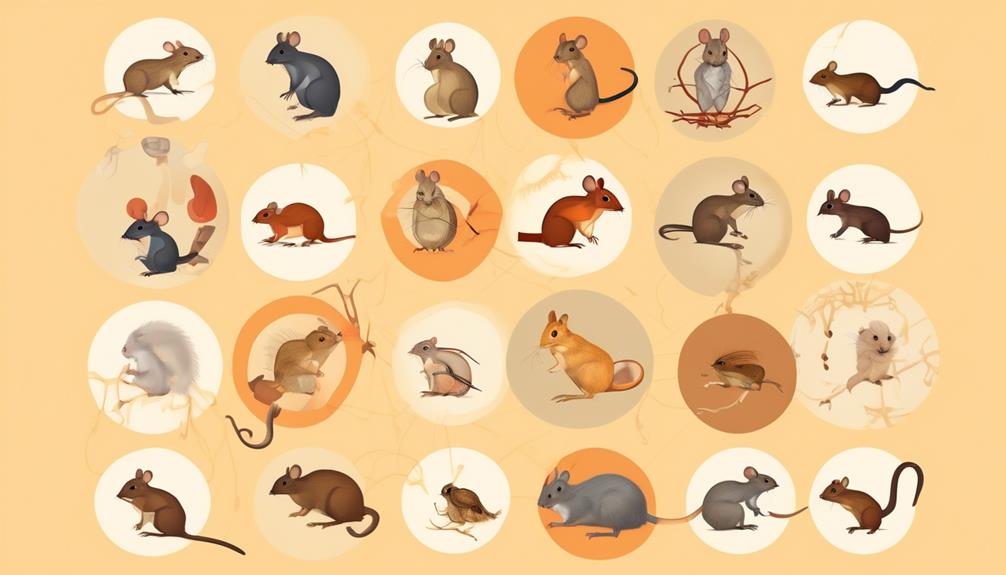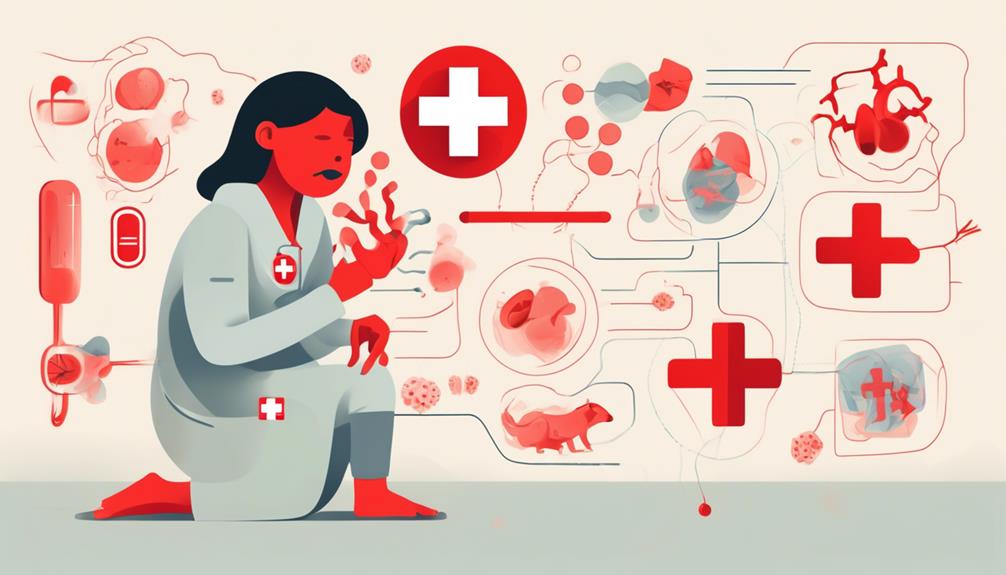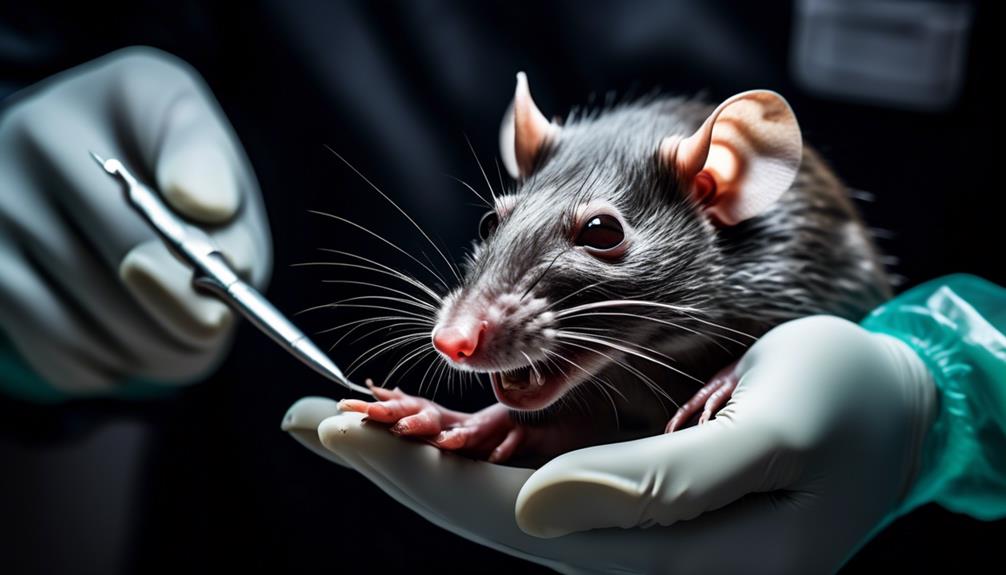Have you ever wondered about the hidden dangers lurking in your own home? While you may have taken precautions to protect yourself and your loved ones from common health risks, there is one potential threat that often goes unnoticed: rodent-borne diseases.
These tiny creatures may seem harmless, but they can carry a range of illnesses that pose serious health risks to humans. From the symptoms to the prevention strategies, this discussion will shed light on the importance of understanding and addressing the potential dangers associated with rodent-borne diseases.
Stay tuned to discover how you can safeguard your health and create a safe environment for you and your family.
Key Takeaways
- Rodent-borne diseases are illnesses transmitted by rodents to humans and can be zoonotic infections.
- These diseases can be transmitted through the bite of infected rodents or direct contact with rodent urine, droppings, or contaminated surfaces.
- Symptoms can vary, but common ones include fever, muscle aches, headache, and nausea.
- Prevention strategies include effective rodent control, proper hygiene practices, and maintaining a clean and clutter-free environment.
Types of Rodent-Borne Diseases

Rodent-borne diseases encompass a range of illnesses transmitted by rodents to humans through various means. These diseases are often zoonotic infections, meaning they can be transmitted between animals and humans.
Rodents, such as rats and mice, can carry harmful bacteria, viruses, and parasites that cause serious health issues. One of the primary ways these diseases are transmitted is through the bite of infected rodents. This can result in vector-borne illnesses, where the rodent acts as a carrier or vector for the disease-causing agent.
Additionally, these diseases can be spread through direct contact with rodent urine, droppings, or contaminated surfaces.
It’s crucial to understand the types of rodent-borne diseases to effectively prevent their transmission and protect your health.
Symptoms of Rodent-Borne Diseases

The symptoms of rodent-borne diseases can vary depending on the specific illness contracted. Some common symptoms include fever, chills, muscle aches, headache, fatigue, and nausea.
In more severe cases, individuals may experience respiratory distress, chest pain, vomiting, and diarrhea.
It’s important to note that the transmission methods of these diseases can vary as well, with some being spread through direct contact with rodent urine, droppings, or saliva, while others can be transmitted through ticks and fleas that infest rodents.
If you suspect you have a rodent-borne disease, it’s crucial to seek medical attention promptly. Treatment options for these diseases may include antibiotics, antiviral medications, or supportive care to manage symptoms.
Early diagnosis and treatment can significantly improve outcomes and prevent complications associated with rodent-borne diseases.
Health Risks Associated With Rodent-Borne Diseases

If left untreated, rodent-borne diseases can pose serious health risks to individuals who’ve been exposed to infected rodents. These diseases are transmitted through direct contact with the rodents, their droppings, urine, or saliva, as well as through contaminated food, water, or surfaces.
The impact of rodent-borne diseases on public health can’t be underestimated. They can lead to a wide range of illnesses, including hantavirus pulmonary syndrome, leptospirosis, and salmonellosis. These diseases can cause severe symptoms such as high fever, muscle aches, vomiting, and in some cases, even organ failure or death.
In addition to the physical toll, these diseases also result in significant economic burdens due to medical expenses, work loss, and reduced productivity. Therefore, it’s crucial to take preventive measures to minimize the risk of rodent-borne disease transmission and protect public health.
Prevention Strategies for Rodent-Borne Diseases

To prevent rodent-borne diseases, it’s essential to implement effective strategies that target rodent control and hygiene practices.
The first step is to address any rodent infestation promptly. This can be done by sealing off any entry points that rodents may be using to gain access to your home or business.
Keep all areas clean and free of food debris, as this can attract rodents. Regularly inspect and clean areas that are commonly infested, such as basements, attics, and storage spaces.
Consider using traps or baits to capture and eliminate rodents. It’s also crucial to educate yourself and others about the risks associated with rodent-borne diseases and the importance of proper hygiene practices.
Creating a Safe and Healthy Environment

Maintain a clean and clutter-free environment to minimize the risk of rodent infestations and promote overall safety and health. Effective hygiene practices are essential in rodent control.
Start by sealing any cracks or openings in your home to prevent rodents from entering. Regularly clean and disinfect areas where rodents are likely to hide, such as storage spaces and garbage areas. Keep food stored in airtight containers and promptly clean any spills or crumbs. Regularly empty trash cans and ensure they’ve tight-fitting lids.
Remove clutter, as it provides hiding places for rodents. Additionally, trim trees and shrubs near your home to prevent rodents from accessing your roof.
Frequently Asked Questions
How Can I Determine if My Pet Has Contracted a Rodent-Borne Disease?
If your pet seems as sick as a dog and you suspect it might have contracted a rodent-borne disease, look out for symptoms like lethargy, weight loss, and respiratory issues. Get them checked by a vet ASAP!
Are There Any Natural Remedies or Alternative Treatments for Rodent-Borne Diseases?
If you’re looking for natural remedies or alternative treatments for rodent-borne diseases, it’s important to consult with a healthcare professional. They can provide evidence-based guidance and determine the best course of action for your specific situation.
Can Rodent-Borne Diseases Be Transmitted Through Food?
Yes, rodent-borne diseases can be transmitted through food. To prevent food contamination, it’s important to practice proper food handling and storage. Implementing rodent control methods can also help minimize the risk of transmission.
Are There Any Specific Populations That Are More Susceptible to Rodent-Borne Diseases?
You might wonder who is most at risk for rodent-borne diseases. Well, certain populations, like those with weakened immune systems or living in unsanitary conditions, are more susceptible. This can have a significant impact on public health.
How Do Rodent-Borne Diseases Impact the Environment and Wildlife Populations?
Rodent-borne diseases can have a significant impact on the environment and wildlife populations. They can disrupt ecosystems, leading to declines in certain species and affecting the overall balance of nature.





